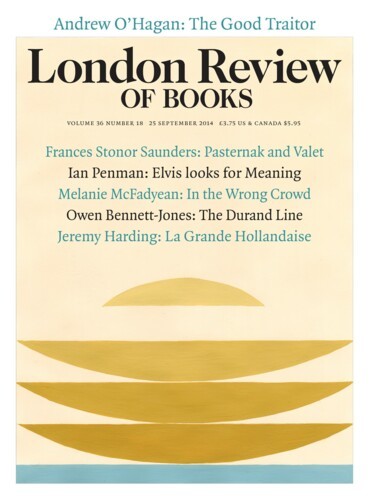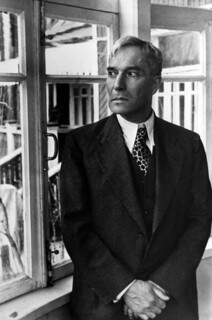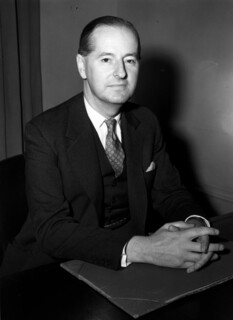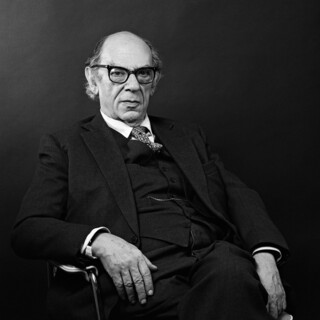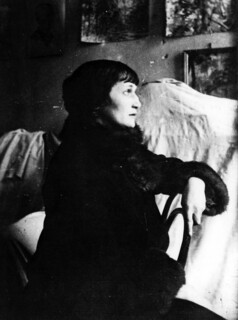Isaiah Berlin was on his honeymoon – he married late – when he first read Dr Zhivago. It was the evening of Saturday, 18 August 1956, and he had just made the short journey back to Moscow from the village of Peredelkino, where he had spent the day with Boris Pasternak. Pasternak’s dacha was part of a complex set up on Stalin’s orders in 1934 to reward the Soviet Union’s most prominent writers. One of them, Korney Chukovsky, described the scheme as ‘entrapping writers within a cocoon of comforts, surrounding them with a network of spies’. Periodically, and usually at night, the NKVD would turn over a dacha and bundle its resident into a waiting car. Pasternak’s immediate neighbour and friend, Boris Pilnyak, was arrested in October 1937, removed to the Lubyanka, and killed with a single bullet to the back of the head. The same fate awaited Isaac Babel, who was taken from Peredelkino in May 1939. There were others, less well known, but equals in the manner of their death.
How Pasternak survived the necropolitics of the Stalin era was a mystery. ‘It is surprising that I remained whole during the Purges,’ he wrote in 1954. ‘You cannot imagine the liberties I allowed myself. My future was shaped in precisely the way I myself shaped it.’ Nadezhda Mandelstam (whose husband, Osip, became ‘camp dust’ in 1938) put it down to a combination of sheer luck and Pasternak’s ‘incredible charm’. Others wondered whether Stalin had personally ordered him to be spared – ‘Leave him alone, he’s a cloud dweller’ – after gifting him what were called, in the political slang of the day, ‘madman’s papers’. True, Pasternak had written some boilerplate patriotic verse during the Second World War, ‘civic poetry’ that encouraged some party hacks in the belief that he had finally found ‘the correct path’. And the translations of Georgian poets were known to have pleased the Boss. But in the main, where others, fatally, confronted argument with argument, he replied with the reveries of a yurodivy, a holy fool, marking his distance from the idiom and events of his era to the point almost of vegetal insouciance (‘What century is it outside?’ he asks in one poem).
In his youth Pasternak looked, Marina Tsvetaeva said, ‘like an Arab and his horse’. In older age, he looked the same. Sinewy and tanned from long walks and tending his orchard, at 66 he was still an intensely physical presence. This was the woodsman-poet who was waiting by the garden gate to greet his friend Isaiah Berlin, 19 years younger, bespectacled and pudgy, his indoor skin betraying the rigours of the Senior Common Room and the international diplomatic circuit.
‘The Foreigner Visiting Pasternak at His Dacha’ is its own subgenre of intellectual history. Its principal theme is the excitement of discovering a lost generation who, like ‘the victims of shipwreck on a desert island’, have been ‘cut off for decades from civilisation’ (Berlin). The foreigner, moved by his role as witness to an impossible reality, records every detail of the encounter: the welcome (Pasternak’s handshake is ‘firm’, his smile ‘exuberant’); the walk (oh, that ‘cool’ pine forest, and look, some dusty peasants); the conversation, with Pasternak holding forth ‘as if Goethe and Shakespeare were his contemporaries’; the meal, at which his wife, ‘dark, plump and inconspicuous’ (and often unnamed), makes a sour appearance; the arrival of other members of the Peredelkino colony, the dead undead; the toasts, invoking spiritual companions – Tolstoy, Chekhov, Scriabin, Rachmaninov. And finally the farewell at the gate, at which Pasternak disappears back into the dacha and re-emerges with sheaves of typescript. These are given to the visitor (‘the guest from the future’, as Anna Akhmatova put it), who is now tasked with the sacred and thrillingly immortalising responsibility of carrying Pasternak’s writings out of this place where the clock has stopped and into the world beyond.
Berlin’s reports of his meetings with Pasternak, which cover two periods spanning a decade, conform to the conventions of the genre (not surprising, as he largely invented it) but his published account of his visit of 18 August 1956 is curiously short on colour, and there is no mention of his bride, Aline, who accompanied him, or of Pasternak’s wife, Zinaida. We learn only that the two men convened in a lengthy conversation, which must have vibrated amid the pine trees like some strange antiphon. Pasternak, Berlin once observed, ‘spoke slowly in a low tenor monotone, with a continuous even sound, something between a humming and a drone’; Berlin’s voice was variously described as ‘a low, rapid rumble’, ‘a melting Russian river’, the ‘bubble and rattle’ of a ‘samovar on the boil’. At some point, Pasternak took Berlin into his study, where he thrust a thick envelope into Berlin’s hands and said: ‘My book, it is all there. It is my last word. Please read it.’
Berlin and Aline returned that evening to the British Embassy on Sofiyskaya Embankment, where they were guests of the ambassador. Berlin sat up all night reading the typescript. He was ‘deeply shaken’. He wept. Dr Zhivago was a ‘magnificent poetical masterpiece in the central tradition of Russian literature’, ‘a personal avowal of overwhelming directness, nobility and depth’. It was a ‘unitary vision’ that fused the broken vertebrae of Russian literature, a miraculous retrieval of the past in an age that had outlawed history.
And so Isaiah wept by the bank of the Moskva River. (Forgive the over-reach, but the river did run in front of the embassy, and what we’re talking about here is not so much Dr Zhivago, as the novel of the novel.) Directly opposite (truly), behind the walls of the Kremlin, the Soviet response to Dr Zhivago was being prepared. In an ‘important memo’, the foreign minister, Dmitry Shepilov, was working himself up to an ulcer. Pasternak’s concoction, he wrote, was ‘a spiteful lampoon against the USSR’, and measures had to be taken ‘to prevent the publication of this anti-Soviet book abroad’. The memo, with attachments supplied by the KGB and the director of the Central Committee’s Culture Department (who emphasised his revulsion at Pasternak’s ‘malicious libel against our revolution and our entire life’), was to be circulated to the highest party officials, including the Politburo and First Secretary Nikita Khrushchev.
The last Russian to publish a novel abroad without official sanction was Boris Pilnyak, and in so doing he had assigned himself his own bullet. In 1948, Pasternak warned his sisters in Oxford against printing some early chapters of Dr Zhivago, which he had sent them via an (unidentified) intermediary. ‘Publication abroad would expose me to the most catastrophic, not to mention fatal, dangers,’ he wrote. Since then, the Thaw (taken from the title of a novel by Ilya Ehrenburg) had ushered in a less chilling repertoire of punishments for writers who wandered from ‘the correct path’. Pasternak was nonetheless taking an enormous risk in offering his novel for publication outside the Soviet Union. But this was his resolve. He hadn’t given the typescript to Berlin to enliven a few hours in his Moscow bivouac, but in order that it should ‘travel over the entire world’ and, quoting Pushkin, ‘lay waste with fire the heart of man’.
As he tells it, Berlin tussled with his conscience before reluctantly accepting the mission of smuggling Dr Zhivago out of Russia. Indeed, a few days after his stirring all-nighter, he returned to Peredelkino, determined to rescue the author from his own intentions – Pasternak, he believed, was flirting with martyrdom and ‘probably did need to be physically saved from himself’. At this second meeting, Zinaida begged Berlin to dissuade her husband from damaging himself and his family. ‘Moved by this plea’, Berlin ventured an alternative solution to Pasternak: ‘I promised to have microfilms of his novel made, to bury them in the four quarters of the globe … so that copies might survive even if a nuclear war broke out.’ Pasternak, who was in no mood to be buried alive mid-sentence, rebuked his friend. He had spoken to his sons and they were prepared to suffer, just as he was (Zinaida’s suffering is not mentioned). At which point Berlin’s bubbling samovar came off the boil. He was, he claims, ‘shamed into silence’.
And so Berlin left the forest, his conscience quieted by Pasternak’s determination to break a lance for a greater prize than his own well-being. ‘I may not deserve to be remembered as a poet,’ he had said, ‘but surely as a soldier in the battle for human freedom.’ Furthermore, he told Berlin that he had already given a typescript to an agent of the Italian communist publisher Giangiacomo Feltrinelli, and this copy was now in Milan (a fact that had been duly noted by the KGB, which was trying to get it back). Dr Zhivago had already crossed the line.
The question for Berlin now was not whether but how to smuggle the manuscript out. He could no longer avail himself of diplomatic privilege, as he had done a decade earlier when he served as first secretary in the Moscow embassy. Then, shortly after meeting Pasternak for the first time, he had used the pouch to exfiltrate an early draft section of Dr Zhivago, sending it to his parents in London in October 1945 with instructions to keep it somewhere safe until his return (perhaps this was the ‘somewhat underground route’ alluded to by Maurice Bowra, Berlin’s key ally in establishing Pasternak’s reputation in the West). Berlin’s interest in Pasternak and other members of the lost tribe had not gone undetected – throughout his posting he had been aware of being followed – and he was ever after burdened with the accusation of having endangered them. ‘I saw quite a lot of very remarkable people,’ he later told an interviewer. ‘It didn’t do them any good.’ This was something of an understatement. His meeting with Akhmatova at her apartment in Leningrad in November 1945 had prompted Stalin’s famous remark, ‘So our nun now receives visits from foreign spies.’ Though Berlin always insisted he’d never been a spy, he was sufficiently versed in Soviet sensibilities to know that all diplomats were suspected of intelligence-gathering, and that everybody they made contact with was, ipso facto, an intelligence source. The consequences for Akhmatova were dire: her apartment was bugged, she was denounced by the Central Committee of the Communist Party, expelled from the Union of Soviet Writers, and her son Lev was arrested for a third time.
Berlin’s 1956 visit to Russia was a further tutorial in the Soviet character. Moving among the members of the Politburo at an embassy reception – the ‘spy’ hiding prominently in plain sight – he found them ‘at once smooth and brutal, class-conscious and corrupt’. Here were the thieves of the Revolution, the same men who had supported Stalin in his massacres. The visit reinforced his suspicion that the Thaw was overestimated in Western liberal circles. The Soviet Union, he concluded, was still expansionist and repressive at heart. In this climate, it’s highly improbable that Berlin ever considered carrying Pasternak’s manuscript out of Russia himself. The only secure option would be to ask his host and friend, the British ambassador William Hayter, to send Dr Zhivago to London in the bag. This might explain how the Foreign Office was able to copy the typescript onto two rolls of microfilm and hand it over to MI6, which in turn delivered it to the CIA, with dreadful consequences for Pasternak.
The story of Dr Zhivago’s publication is, like the novel itself, a cat’s cradle, an eternal zigzag of plotlines, coincidences, inconsistencies and maddening disappearances. The book was always destined to become a ‘succès de scandale’, in Berlin’s words, but the machinations and competing energies that went into seeing it into print, on the one hand, and trying to stop it going to print, on the other, make it the perfect synecdoche for that feint, counterfeint round of pugilism we call the Cold War. Some punches were landed, of course, reminding the contestants that this was a real fight and not just a protracted argument about washing machines. But the Cold War was also a great engine of false realities, and the Zhivago Affair (as it immediately became known) is the story of how its protagonists became embroiled in these inventions and, more controversially, enlarged them.
‘I am content to observe, not interfere and have all my life been afraid above all of being involved,’ Berlin once told a friend. Impatient with this legend of self-effacement, Pasternak’s sister Lydia (who lived in Oxford) moaned: ‘His present power over literature, in fact over everything in every field, is at times almost disastrous, I do not know how he contrives to hold everybody in such constant awe and fear of his casual judgment.’ Her view is supported by Berlin’s own papers at the Bodleian, which show him to have been energetically meddlesome in the Dr Zhivago business from the moment he returned from his Moscow honeymoon. ‘I think I could probably procure the manuscript somewhere, some time,’ he writes airily to an editor at Hamish Hamilton who has inquired about the novel. ‘But I cannot guarantee this of course. Do not tell anyone else about it at the moment, except Mark [Bonham Carter], of course.’ He adds that he hasn’t read the manuscript, so is unable to say whether it’s a work of genius. On the same day, he offers the same tease to Bonham Carter, of Collins Harvill: ‘It is possible that I myself may have a text in England, but it is none too certain, and we had better speak about this orally.’ Again, he claims not to have read it.
Publishers can rarely be relied on for their discretion, but why such subterfuge, and why the trim denial of having read the novel? Why didn’t Berlin simply say: I got the manuscript out, I know exactly where it is, I have read it and it’s a masterpiece and it must be published both on its own merits and as a strike against the Soviets, who refuse to allow their greatest living writer to be heard in his own country? There are several possible explanations for Berlin’s coyness. One is that the ‘first’ smuggled typescript – 433 closely typed pages held together by twine and wrapped in newspaper – was in the hands of Feltrinelli in Italy. Berlin feared that Feltrinelli might tamper with the text or even be dissuaded from publishing it (neither happened, though the Soviets did put their wayward comrade under huge pressure to return the manuscript to Moscow). Worse, Pasternak had granted all foreign rights to Feltrinelli, so legally the Oxford text couldn’t be published without his permission.
Pasternak’s game of hide and seek with the Soviet authorities was creating endless confusion and delay among his foreign proxies. He seemed to be havering between outright provocation – telling one visitor that publishing the book abroad might be a ‘means to bring pressure on the Soviets to publish the book in Russia for fear of looking tyrannous if they don’t’ – and a strategy of shaming the Soviets into publishing it first. He had submitted the novel to the state literary publisher Goslitizdat, and to the journal Novy Mir, in the sincere belief that it might be published (once the censor had taken his pound of flesh). An encouraging sign came just as Berlin visited in August 1956, with Novy Mir’s publication of the first instalment of Vladimir Dudintsev’s novel Not by Bread Alone, whose picaresque depiction of ‘the invisible empire’ of Soviet bureaucracy made it wildly popular with Russian readers. But Novy Mir was less receptive to Pasternak’s novel, and within weeks of Berlin’s departure its editors sent a rejection letter explaining that no amount of cutting or revising would solve the problem of ‘the spirit of the novel’ and its ‘non-acceptance of the socialist revolution’. Goslitizdat turned it down too.
‘You can’t make an omelette without breaking eggs’ was a favoured slogan in the vade-mecum of Bolshevism. By the end of 1957 there were at least six original, non-identical typescripts of Dr Zhivago in foreign hands, and chasing them down is like trying to make an egg from an omelette. The most conscientious attempt so far is Paolo Mancosu’s Inside the Zhivago Storm: The Editorial Adventures of Pasternak’s Masterpiece, which includes in an appendix all the relevant correspondence from the Feltrinelli archive.1 This scholarly, scrupulously even-handed work, published last year, has been unfairly eclipsed by The Zhivago Affair: The Kremlin, the CIA, and the Battle over a Forbidden Book, in which the journalists Peter Finn and Petra Couvée pick through a cache of documents, released to them by the CIA, that confirms the long extant rumour of the agency’s role in publishing the text in Russian.2 This rumour had already been investigated (it took him twenty years) by Ivan Tolstoy, whose research was published in Russian in 2009 as The Laundered Novel: ‘Dr Zhivago’, between the KGB and the CIA. Tolstoy’s monograph, untranslated and lacking the prima facie evidence procured by Finn and Couvée, went largely unreported in the West. Long forgotten is Robert Conquest’s The Courage of Genius: The Pasternak Affair, published in 1961, as impartial an account as you could expect from someone who had been employed in the Foreign Office’s propaganda shop for more than a decade. Add to these Evgeny Pasternak’s Boris Pasternak: The Tragic Years, 1930-60 (1990), Sergio D’Angelo’s The Pasternak Affair: Memoirs of a Witness (2006), and the ensuing, sulphurous arguments between these two, and you end up with a big almost-egg and a sinking feeling in your stomach (this is, literally, an unwholesome business).
In all of these thousands of pages devoted to the Zhivago affair, Berlin’s testimony is reprised without question. He is treated as an impeccable witness, the humble valet to Pasternak’s will, into whose hands fell one of the greatest books of the century as if by accident. Yet an exchange of letters in Berlin’s papers, to date overlooked, suggests a rather different scenario. In April 1956, Berlin received from Martin Malia a detailed report of two separate meetings with Pasternak at Peredelkino. Malia was a Harvard academic on assignment in Russia for the Library of Congress, ostensibly to negotiate book exchanges. (He may have been doing more than that. In 1967 he was accused by the Russian government of working for the CIA and told to leave the country.) On arriving in Moscow, he had immediately sought out Pasternak, who had confided that he had ‘sent out the first five parts’ of Dr Zhivago ‘via a friend at the New Zealand Embassy’, and was planning to give the later parts, which he was currently revising, ‘to some French students now at the University of Moscow for shipment out through the pouch’. Berlin’s reply is not in the file, but a later letter from Malia contains its echo: Berlin wanted more exact details, in particular to know how he might make contact with the French students.
Why would Berlin the observer – ‘I have no personal interest in this’ – press for this information if not to become involved? Most likely, on learning that the novel was being dispatched hither and thither through diplomatic bags, and knowing that a historic literary event loomed, he was eager to obtain a copy himself, and made arrangements to this end. A letter from Pasternak to his sisters in Oxford, dated four days before the visit of 18 August 1956, confirms that Berlin’s mission had already been agreed. ‘I’ll give B one copy,’ it reads. ‘He promised me that the typescript would be transcribed in multiple copies in England … He will look after this himself, you don’t need to worry about it.’
Why go to such lengths if Pasternak had already found ways to get the text out of Russia? If, as Berlin was to claim, Pasternak wanted ‘to speak across the heads of his jailers to the free world’, then surely a megaphone in New Zealand or France would do as well as anywhere? A speculative answer, covering the gnomic angle of Berlin’s letters to the British publishers, is that he wanted to be at the centre of an intrigue. Indeed, he was a ganglion of secrets. ‘I know all about the situation – & perhaps a little more than all,’ he murmured side-of-mouth to Edmund Wilson late in 1957. ‘There is a (secret) Russian text in Oxford, in the keeping of the sisters of the poet: they guard it like Cerberi … I have (secretly) got a microfilm of the Russian text to the Widener Library for safe-keeping, but they are not supposed to tell anyone.’
Berlin had made a significant intellectual and emotional investment in Dr Zhivago, and he too was guarding it like Cerberus. Like many Russians forced to emigrate in the wake of the Revolution (whose excesses he had witnessed as a boy in Petrograd), he couldn’t accept that Pushkin was gone and the light coming from Tolstoy’s country estate extinguished. In the USSR, there was no place for such metaphysical antiquities, or for their heirs who, like Nabokov’s ‘gaunt ladies with lorgnettes’, sighed for a world that had been swept away. St Paul’s, Oxford and the Foreign Office couldn’t dispel in Berlin the psychological vulnerability of the diaspora, of ‘Russia Abroad’, that strange in-between place where, as Semyon Frank said, one had to ‘live and breathe in a vacuum’.
‘Zhivago’, in the pre-revolutionary genitive case, means ‘the living one’. On the novel’s first page a hearse is being followed to the grave. ‘Whom are you burying?’ the mourners are asked. ‘Zhivago’ is the reply, punningly suggesting ‘him who is living’. After his first reading of the draft early chapters, at the British Embassy in Moscow in 1945, Berlin felt that he had seen a flare sent up from the survivor of a cataclysm. Swept away by the novel’s defiant personal claim for the indomitable Russian soul, he was sure that Bolshevism’s systematic programme of turning Russia away from Western civilisation couldn’t be completed as long as such writing existed. Before leaving his diplomatic post, he turned in a long memorandum – what he called, misleadingly, a ‘rambling discourse on the Russian writers’ – containing extended resumés of his meetings with Pasternak, Akhmatova, Chukovsky and others. It was a founding text of the Kulturkampf, as important in its way as George Kennan’s Long Telegram (also written in 1946) was to the shaping of the political Cold War. In a letter accompanying the report, Berlin requested that it be treated as ‘confidential’ because of ‘the well-known consequences to the possible sources of the information contained in it, should its existence ever become known to “them”’.
We’ll call this next chapter in the novel of the novel ‘The Alphabet Men’. It’s the bit where the CIA, MI6 and their little helpers at the FO, IRD, BBC, IOD, SRD, CCF, RFE, RL, VOA and BVD process the purloined microfilm of the Russian text into ‘combat material’ for the Cold War.3 It’s 1958, Dr Zhivago has finally been issued in Italian by Feltrinelli, and other translations are edging their way off the press in Britain, Germany and France. But Feltrinelli is refusing the rights to a Russian edition until Pasternak gives him the go-ahead. Pasternak hesitates, gambling on ever poorer odds that the novel might yet appear in Russia. Should this not be the case, and fearing a provocation too far, he explicitly requests that no eventual Russian language edition appear in the West under the auspices of any Russian émigré group or American entity. No matter, the CIA has already embarked on Operation Dinosaur, whose aim is to exploit Pasternak’s ‘heretical literary work’ for ‘maximum free world discussion and acclaim and consideration for such honour as the Nobel Prize’. According to a declassified memo quoted by Finn and Couvée in The Zhivago Affair, MI6 are ‘in favour and have offered to provide whatever assistance they can’.
Since the prize can’t be awarded for a work not published in its original language, the CIA prints an edition through a cut-out, or front, in Holland. This, the first ever appearance in Russian of the original text, deals with the Nobel Prize requirement. Encouraged by the success of this covert action, Operation Dinosaur – authorised at the highest levels, which includes the White House – produces another, pocket-sized edition (‘more easily concealed’) for distribution behind the Iron Curtain. Attributed to ‘an innocuous, fictitious publisher’, Société d’Edition et d’Impression Mondiale, and printed at CIA headquarters on thin bible stock, this miniature Dr Zhivago is shipped to Europe and handed out to anyone who might carry it into the Soviet bloc (among the various ‘pass throughs’ enlisted to this act of piracy we find the Holy See, that well-known upholder of the right of individuals to read whatever they please). By this means, Dr Zhivago crosses the line back into Russia.
These editions were both thefts. As explained by the CIA, the operation was ‘intended to be legal but turned out to be illegal’ (you don’t make apologies when you hold the moral high ground). Internal inquiries were made about international copyright law, but legality proving inconvenient, the decision was taken to ‘do it black’. However, an escrow account was set up in Pasternak’s name for his share of the royalties, ‘if he is ever in a position to use them’. What, one wonders, did the CIA do with its share?
No amount of money – not even the Nobel Prize, which was announced on 23 October 1958 – could compensate for the shitstorm into which Pasternak was now thrown. As a CIA analysis quoted by Finn and Couvée reads, ‘so long as his impact was contained within the Soviet Union, it could be tolerated; when it came to appear as a chosen vessel of Free World cold war, it had to be crushed.’ For the spooks, this was hardly an unexpected outcome. It was only after Not by Bread Alone was published in English in 1957, and trumpeted as an anti-Soviet novel by the Western media, that Dudintsev earned the full wrath of the regime. His disavowal of the propaganda value of his book – he said it made him feel as though ‘a peaceable ship in foreign waters had been seized by pirates and was flying the skull and crossbones’ – didn’t placate the authorities. He was shunned, banned and harried into poverty. So, too, Pasternak was vilified as a traitor, denigrated in a massive official campaign as a ‘literary weed’, a ‘superfluous man’, a ‘mangy sheep’, a ‘pig’ who ‘has soiled the place where he has eaten’.
Driven nearly to suicide, on 29 October Pasternak declined the Nobel Prize. ‘I couldn’t recognise my father when I saw him that evening,’ his son Evgeny recalled. ‘Pale, lifeless face, tired painful eyes, and only speaking about the same thing: “Now it all doesn’t matter, I declined the Prize.”’ Two days later, he was hounded out of the Union of Soviet Writers, whose members petitioned the Politburo to strip him of his Soviet citizenship and exile him to ‘his capitalist paradise’. The American Catholic writer and monk Thomas Merton pleaded with the union’s chief, Aleksey Surkov, to reverse the decision, arguing in a letter that Dr Zhivago was far less critical of communism than Khrushchev had been two years earlier in his speech denouncing Stalin at the Twentieth Party Congress. This startlingly obvious point was missed by everyone who jostled for a berth on the ship of fools.4
To Pasternak, Merton wrote: ‘For a long time I have been holding my breath in the midst of the turmoil of incomparable nonsense that has surrounded your name in every part of the world … You, like Job, have been surrounded not by three or four misguided comforters, but by a whole world of madmen … and seemingly very few of them have understood one word of what you have written. For what could be more blind and absurd than to make a political weapon, for one side or the other, out of a book that declares clearly the futility and malignity of tendencies on every side which seek to destroy man in his spiritual substance?’ Before this letter reached Pasternak, it was intercepted, photocopied and resealed, first by the CIA then by the KGB.
While the drama of Pasternak’s excommunication was in progress, Oxford was a very tense place. It was from here that Berlin, since returning from Moscow in 1946, had worked to create a reputation – a vital ‘little corner’ of recognition – for Pasternak in the West. He operated largely behind the scenes (he once told George Kennan that he had refused to let the press quote a lecture ‘because I thought if I did, poor Pasternak etc would finally be shot’), while front of house was his colleague Maurice Bowra – Pasternak called them the ‘University B’s’ – and left and right of stage were Pasternak’s sisters, Josephine and Lydia, with a small cast of exiled Russian scholars. Inevitably, everyone fell out with everyone else and then made up again. But as the horror was unleashed on Pasternak, there were tears of anguish and bitter recriminations in his Oxford court.
‘If something awful happens to Pasternak, I do not want to feel that anything I did could have even remotely contributed to it,’ Berlin wrote to a friend in late October. Having long positioned himself as a guardian of Pasternak’s interests, a role that increased the voltage of his own reputation and influence, he was now faced with the realisation that he might have made a serious miscalculation. All along, he had worried about ‘them’ – the KGB, the Politburo, the hatchet men of Soviet culture – but he had failed to factor in the danger from his own side: the Foreign Office, MI6 and all those cultural freedom experts stationed behind their typewriters, ready to serve up Dr Zhivago as a political pamphlet.
Berlin made frantic efforts to stem the flow of ‘vulgar propaganda’, much of which was being churned out by the fronts and ‘assets’ of MI6 and the CIA. He tried, unsuccessfully, to dissuade the BBC from broadcasting instalments of the novel over the Russian Service (another theft, as the corporation hadn’t secured the rights), warning that ‘the danger to the poet was great and the advantage, even from the most extreme Cold War point of view, not very great, and that playing about with lives in this way was a hideous immorality.’ The broadcasts, Berlin later stated, were ‘perhaps the worst of all the acts of persecution on our part’. His attempt to convince Time magazine to abandon a cover story on Pasternak was also unsuccessful. The freedom army was marching under the banner of Dr Zhivago, and nothing could break its step. ‘Just because someone is prepared for a martyr’s crown, that doesn’t give one the right to press it on his brow,’ he wrote angrily. ‘The whole thing really is revolting.’ Reflecting on the scandal years later, Czesław Miłosz said that Pasternak ‘found himself entangled in the kind of ambiguity that ought to be the nightmare of every author. While he always stressed the unity of his work, that unity was broken by circumstances. Abuse was heaped on him in Russia for a novel nobody had read. Praise was lavished on him in the West for a novel isolated from his lifelong labours … In the last years of his life Pasternak lost, so to speak, the right to his personality, and his name served to designate a cause.’
Dr Zhivago may be a great novel, but in the battlefield of the Cold War it had to be great in order to be a powerful weapon. Any victory in a war of this kind is bound to be pyrrhic, and nobody emerges from it with much glory, not even Pasternak. We mustn’t lick all the paint off our gods, but his reputation is not, ultimately, enhanced by the thick layer of piety applied to him by his eager publicists in the West. As early as 1927, Nadezhda Mandelstam had warned him: ‘Watch out, or they’ll adopt you.’ She was referring to the Soviets, but she never had any truck with the ‘professional humanists’ of the West either, and the warning could equally have applied to their blandishments. If Pasternak became a permanent protégé of the West – giving away ‘the wealth of his soul’ in the process, according to his son Evgeny – it was not only because he was deceived (and he was). It was also down to his stubborn insistence on making a grand gesture, on putting himself forward as the charismatic bearer of Russia’s tragic soul.
‘You are invited to my execution,’ Pasternak announced when he handed the typescript to Feltrinelli’s agent in May 1956 (other visitors at the time report similar declarations). For his friends Anna Akhmatova and Nadezhda Mandelstam, who had both lost husbands to the executioners, this self-dramatisation was rather distasteful. According to Hugh Trevor-Roper, writing in late 1958, ‘everyone who knows Pasternak agrees that he positively wanted trouble. Apparently he had a feeling of guilt and a desire for martyrdom. He was personally liked and protected by Stalin, and so survived when many of his friends perished, and is now ashamed of this. So at least Isaiah [says].’ ‘He thinks that he might gain from it the halo of a victim,’ an Italian insider told the young literary editor Italo Calvino. It’s not that Pasternak hadn’t been courageous – there are numerous acts of selfless, indeed reckless concern for others – and he surely didn’t deserve to be saddled with a bad conscience. But in his ‘yielding himself up’ there was, as Nadezhda Mandelstam sensed, a ‘secret desire’ to promote himself. He wanted, in his own words, ‘to suffer as all the true Russian poets have always suffered’. There were many people, friends as well as enemies, who were willing to help him.
‘It is easier to save a manuscript than a man,’ Nadezhda Mandelstam said. It’s an uncomfortable thought, but perhaps Pasternak didn’t want to be saved. The holy fool in his dacha, ‘cocooned in comfort’, singing paeans to the ‘joy’ of being alive in nature’s bosom while his neighbours were taken away, liquidated and replaced – all this rapture, this élan vital, left him no exit for his moral indignation at the break-up of the world around him. Life, he believed, was superior to any cause. He could never have been a journeyman in the Soviet interpretation of reality, but he became uncomfortable with the exemptions his self-alienation had granted him. With Dr Zhivago, privately for many years and then very publicly, he found the means to ‘touch the sores of the era with his own hands’ (Nadezhda Mandelstam again). And it was this, his family believed, that sent him to an early grave.
Pasternak died on 30 May 1960. His last words were ‘Don’t forget to open the window tomorrow.’ His funeral was attended by thousands, many of whom defied the secret police to linger long after his coffin was lowered into the ground. A few months later, Berlin received from Pasternak’s French translator, Jacqueline de Proyart, a magazine spread with photographs of the obsequies. ‘They were meant to move me,’ Berlin confided to a friend, ‘but in fact produced a ghastly effect. I sent them back to her. The corpse, the coffin, the wife, the mistress, the whole thing has a nightmarish quality for me.’ If he did send it back, he must have received another copy because the article is still there in his papers.
Send Letters To:
The Editor
London Review of Books,
28 Little Russell Street
London, WC1A 2HN
letters@lrb.co.uk
Please include name, address, and a telephone number.
